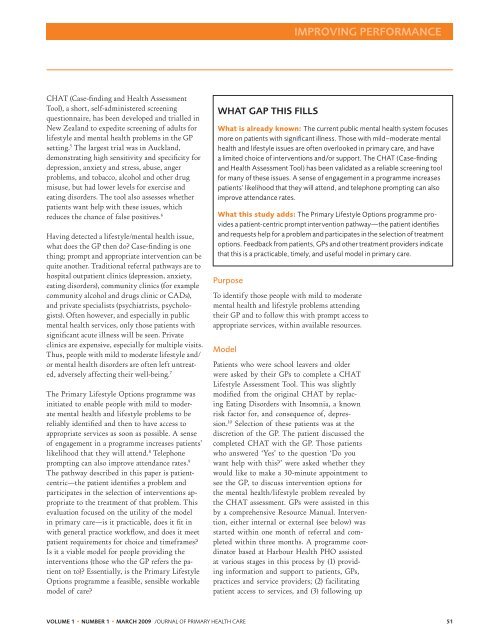entire issue. - The Royal New Zealand College of General ...
entire issue. - The Royal New Zealand College of General ...
entire issue. - The Royal New Zealand College of General ...
Create successful ePaper yourself
Turn your PDF publications into a flip-book with our unique Google optimized e-Paper software.
CHAT (Case-finding and Health Assessment<br />
Tool), a short, self-administered screening<br />
questionnaire, has been developed and trialled in<br />
<strong>New</strong> <strong>Zealand</strong> to expedite screening <strong>of</strong> adults for<br />
lifestyle and mental health problems in the GP<br />
setting. 5 <strong>The</strong> largest trial was in Auckland,<br />
demonstrating high sensitivity and specificity for<br />
depression, anxiety and stress, abuse, anger<br />
problems, and tobacco, alcohol and other drug<br />
misuse, but had lower levels for exercise and<br />
eating disorders. <strong>The</strong> tool also assesses whether<br />
patients want help with these <strong>issue</strong>s, which<br />
reduces the chance <strong>of</strong> false positives. 6<br />
Having detected a lifestyle/mental health <strong>issue</strong>,<br />
what does the GP then do? Case-finding is one<br />
thing; prompt and appropriate intervention can be<br />
quite another. Traditional referral pathways are to<br />
hospital outpatient clinics (depression, anxiety,<br />
eating disorders), community clinics (for example<br />
community alcohol and drugs clinic or CADs),<br />
and private specialists (psychiatrists, psychologists).<br />
Often however, and especially in public<br />
mental health services, only those patients with<br />
significant acute illness will be seen. Private<br />
clinics are expensive, especially for multiple visits.<br />
Thus, people with mild to moderate lifestyle and/<br />
or mental health disorders are <strong>of</strong>ten left untreated,<br />
adversely affecting their well-being. 7<br />
<strong>The</strong> Primary Lifestyle Options programme was<br />
initiated to enable people with mild to moderate<br />
mental health and lifestyle problems to be<br />
reliably identified and then to have access to<br />
appropriate services as soon as possible. A sense<br />
<strong>of</strong> engagement in a programme increases patients’<br />
likelihood that they will attend. 8 Telephone<br />
prompting can also improve attendance rates. 9<br />
<strong>The</strong> pathway described in this paper is patientcentric—the<br />
patient identifies a problem and<br />
participates in the selection <strong>of</strong> interventions appropriate<br />
to the treatment <strong>of</strong> that problem. This<br />
evaluation focused on the utility <strong>of</strong> the model<br />
in primary care—is it practicable, does it fit in<br />
with general practice workflow, and does it meet<br />
patient requirements for choice and timeframes?<br />
Is it a viable model for people providing the<br />
interventions (those who the GP refers the patient<br />
on to)? Essentially, is the Primary Lifestyle<br />
Options programme a feasible, sensible workable<br />
model <strong>of</strong> care?<br />
wHAT gAP THiS fiLLS<br />
What is already known: <strong>The</strong> current public mental health system focuses<br />
more on patients with significant illness. Those with mild–moderate mental<br />
health and lifestyle <strong>issue</strong>s are <strong>of</strong>ten overlooked in primary care, and have<br />
a limited choice <strong>of</strong> interventions and/or support. <strong>The</strong> CHAT (Case-finding<br />
and Health Assessment Tool) has been validated as a reliable screening tool<br />
for many <strong>of</strong> these <strong>issue</strong>s. A sense <strong>of</strong> engagement in a programme increases<br />
patients’ likelihood that they will attend, and telephone prompting can also<br />
improve attendance rates.<br />
What this study adds: <strong>The</strong> Primary Lifestyle Options programme provides<br />
a patient-centric prompt intervention pathway—the patient identifies<br />
and requests help for a problem and participates in the selection <strong>of</strong> treatment<br />
options. Feedback from patients, GPs and other treatment providers indicate<br />
that this is a practicable, timely, and useful model in primary care.<br />
Purpose<br />
To identify those people with mild to moderate<br />
mental health and lifestyle problems attending<br />
their GP and to follow this with prompt access to<br />
appropriate services, within available resources.<br />
Model<br />
iMPROViNg PERfORMANCE<br />
Patients who were school leavers and older<br />
were asked by their GPs to complete a CHAT<br />
Lifestyle Assessment Tool. This was slightly<br />
modified from the original CHAT by replacing<br />
Eating Disorders with Insomnia, a known<br />
risk factor for, and consequence <strong>of</strong>, depression.<br />
10 Selection <strong>of</strong> these patients was at the<br />
discretion <strong>of</strong> the GP. <strong>The</strong> patient discussed the<br />
completed CHAT with the GP. Those patients<br />
who answered ‘Yes’ to the question ‘Do you<br />
want help with this?’ were asked whether they<br />
would like to make a 30-minute appointment to<br />
see the GP, to discuss intervention options for<br />
the mental health/lifestyle problem revealed by<br />
the CHAT assessment. GPs were assisted in this<br />
by a comprehensive Resource Manual. Intervention,<br />
either internal or external (see below) was<br />
started within one month <strong>of</strong> referral and completed<br />
within three months. A programme coordinator<br />
based at Harbour Health PHO assisted<br />
at various stages in this process by (1) providing<br />
information and support to patients, GPs,<br />
practices and service providers; (2) facilitating<br />
patient access to services, and (3) following up<br />
VOLUME 1 • NUMBER 1 • MARCH 2009 J OURNAL OF PRIMARY HEALTH CARE 51

















